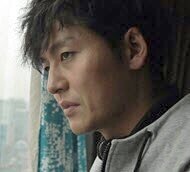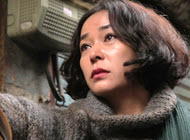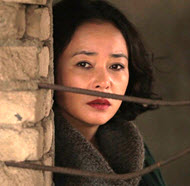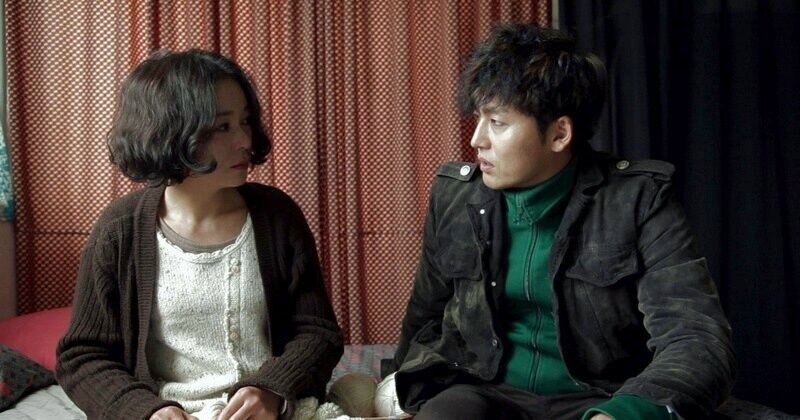Pietà
Reviewed by: Kyria Collins
CONTRIBUTOR
| Moral Rating: | Extremely Offensive |
| Moviemaking Quality: |
|
| Primary Audience: | Adults |
| Genre: | Foreign (Korean) Drama |
| Length: | 1 hr. 44 min. |
| Year of Release: | 2012 |
| USA Release: |
February 9, 2013 (festival) May 17, 2013 (NYC) |





About loans, usury, debt and jubilee in the Bible
About sin and the fall of man to depravity
Cruelty and brutality
The awful results and evil of revenge
FILM VIOLENCE—How does viewing violence in movies affect families? Answer
SUICIDE—What does the Bible say? Answer
If a Christian commits suicide, will they go to Heaven? Answer
Are you good enough to get to Heaven? Answer
How good is good enough? Answer
Will all mankind eventually be saved? Answer




| Featuring |
|---|
|
Jung-Jin Lee (Jeong-jin Lee) … Gang-Do (Lee Kang-do) Min-soo Jo (Jo Min-su) … Mi-Son (Jang Mi-sun) Ki-Hong Woo … Hoon-chul Eunjin Kang … Myeong-ja (Hoon-Chul's wife) Jae-ryong Cho … Tae-seung Myeong-ja Lee … Mother of suicidal man Jun-seok Heo … Man who commited suicide Se-in Kwon … Machinist with the guitar Mun-su Song … Borrower who climbs the steps Beom-jun Kim … Myeongdong man Jong-hak Son … Boss Jin Yong-Ok … Shop owner in wheelchair Jae-rok Kim … Monk Won-jang Lee … Sang-gu |
| Director |
|
Kim Soon-Mo |
| Producer |
|
Ki-duk Kim (Kim Ki-duk) Kim Ki-Duk Film [S Korea] Good Film [S Korea] Finecut [S Korea] |
| Distributor |
|
Drafthouse Films Next Entertainment World Co. (NEW) |
When it comes to crime thrillers and psychological dramas/potboilers, there are plenty of them that are tense, gritty, visceral, suspenseful, edgy, intense and fast-paced enough to get me heavily invested and on the edge of my seat, but rarely do I ever see a thriller that not only has the type of pacing that is more subtle, slow-burning, understated and minimalistic then building from there into a crescendo-like climax, but also has the ability to haunt me. I mean that in the strong and very real sense of not just having a story that’s thought-provoking and challenging enough to have me thinking about, analyzing and pondering on it day and night, but also with a metaphorical cloud of numbness, exhaustion and melancholia hanging over me, as well as deep inside my mind and spirit, and then the additional feeling of that “cloud” turning into smoke that I inhale into my nostrils and that fills up my lungs, leaving me with the overwhelming sensation of being slowly suffocated from the inside out, as well as with the pervading thought of, “Could that have been me?”
“Pietà,” the 18th film by prolific and controversial South Korean film director Kim Ki-duk—and titled after both the famous religious sculpture of the Virgin Mary holding the crucified Body of Christ and the Italian word meaning “pity” or “piety”—for me, did exactly that, despite having previously researched the story as a way to mentally prepare myself for what I was getting into (for any veteran fans of Kiduk, it’s not hard to figure out why!).
This dark, eerie, intense and haunting story focuses on Lee Kang-do, a man who lives an empty, barren, lonely and isolated life, while working as a loan shark for a debt collector in the notably industrialized and poverty-stricken neighborhood of Cheonggyecheon (which ironically happens to be the place where Kiduk grew up). However, Kang-do is far from being a timid, fragile and submissive, victimized puppet of capitalism and society, overall, as he’s someone who is bitter, menacing, cold, brutal, vicious, sadistic, unmerciful, malicious, ruthless, malevolent, abusive, depraved and cruel—committing acts of horrific physical brutality on those who are unable or unwilling to pay their debts, and going as far as to permanently maim and disable them, and doing so with no remorse.
As you can see, Kang-do is NOT someone you’d root for or feel sorry for, by any means, and the scenes where he beats and brutalizes people are indeed hard and infuriating to watch. If that’s not enough to prove his depravity, then there are scenes where he catches chickens and skins and cooks them alive instead of just buying them at the market. Considering this, it’s not a stretch to see the extent of how he applies this brutality to humans, as well. Also, there’s awkward and uncomfortable scenes of him (*rrrrgh*, do I HAVE to say it??) masturbating in his sleep and walking around his unkempt house, which includes leaving parts of animal intestines lying around on the bathroom floor and not even bothering to clean them up.
Learn more about sin and the fall of man to depravity
This continues to speak loud volumes about Kang-do’s depravity, as well as the subtle sense of hopelessness surrounding him and the desperate yearning for human love and connection hidden beneath his cruel façade. Little does Kang-do know, however, that during his daily operations of collecting debts and beating and maiming them out of people, a mysterious woman named Jang Misun is quietly watching and following him the entire time, doing so in a way that’s eerie and delicately quiet enough to be almost otherworldly. Then one day, while following him, she calls out his name twice. He stops to face her, and she reveals herself as his biological mother and says, “I’m sorry I abandoned you” and gets on her knees in humble repentance.
Initially, Kang-do coldly pushes her away and even reacts harshly and abusively to Misun, even when she randomly shows up at, and enters, his apartment and starts cleaning it up, or even, in a strange twist, helps Kang-do cripple and brutalize one of the people he’s trying to collect a debt from, in an incredibly strange act of what can be perceived and interpreted as love mixed with wanting to prove herself as his mother, since Kang-do doesn’t believe her. Seeing this adamance in Misun to prove herself leads Kang-do to raise the stakes even higher, in a more grim and disturbing manner that makes the movie very unsettling and hard to watch at one point, as Kang-do (warning: not for sensitive readers and the faint of heart) forces Misun to eat part of what appears to be raw meat, but is actually his own big toe, and then goes on to brutally rape her on top of that.
Crazier and stranger enough is that not only does Misun stay with Kang-do, instead of fleeing and calling the police, they slowly but surely form a close, loving relationship, and, even more surprisingly, Kang-do himself even starts to change into a softer, kinder person, which, in spite of the still unsettling vibe to this strange relationship, considering the cruel acts of abuse and humiliation that Kang-do subjected Misun to and the understandable reactions of shock, disgust, confusion and astonishment that viewers might have, strongly indicates that this is what Kang-do needed all along—just someone to love, care for and be there for him. This, in turn, leads to some redemptive change in Kang-do and his character. He goes on to quit his job as a debt collector.
With all of this taking place, one can assume that is all there is to this story… but it’s not, as Misun’s true motivation behind strongly clinging to Kang-do and entering his life is more than just loyalty, sacrificial love and need for redemption. It is actually a lot more sinister and malevolent beneath the surface.
“Pieta” is dark, sad and tragic from the moment the movie starts. In fact, the very first opening scene that is a wheelchair-bound man committing suicide by hanging, and then we hear a woman’s anguished scream in the background, as the movie’s title is shown (important later). There’s also a gloomy, mournful weariness in the mood and atmosphere of the film, which makes sense, considering that the story is set in an impoverished neighborhood where many people are in great desperation to make ends meet and are willing to do just about anything to survive.
One of the people whom Kang-do visits and is about to cripple in favor of debt payments is a guitar-playing musician, as well as a young husband and father of a newborn infant who actually shows enthusiasm and willingness at being crippled, since it means a debt is being payed, it also means a better, more prosperous life for his family and especially his baby son. Though Kang-do, in the midst of his slow transformation into a kinder, gentler person, expresses compassion and mercifully lets the young man off the hook and leaves, the young man turns around and decides to cripple himself. This form of intense desperation is palpable throughout the movie (and the fact that director Kim Kiduk grew up in this town makes it all the more personal).
Yet, so is the anger. The anger from those whom Kang-do cripples, the anger from Kang-do’s bosses when he quits, Kang-do himself during the earlier parts of the movie and eventually Misun, especially when *(*SPOILER/TWIST ALERT*) it later turns out that Misun is not Kang-do’s mother, but is actually the mother of the paralyzed man who hanged himself at the beginning of the movie. It’s also revealed that this same man was someone whom Kang-do had also brutalized and crippled previously. Thus, everything that Misun did for Kang-do—claiming to be his mother, cleaning his apartment, tending to him, feeding him, staying with him and even tolerating his mistreatment of her and loving him—was all an act, a ruse and a facade to get revenge on Kang-do, and the first step to do that was to soften Kang-do and get him to let his guard down, so that Misun could hurt and ruin him, when he’s at his weakest and most vulnerable, just like she was deeply hurt, ruined and emotionally scarred by her son’s suicide from what Kang-do did.
This adds a disturbing and nasty twist to the movie and story, turning it from a tale of love, forgiveness and redemption into a tale of hatred, rage, malice and revenge that spins out of control.
In the end, Misun, with the help of the grandmother of a man who previously held her hostage at knife point, whom Kang-do fought off—both of whom Misun may very well have (as implied) recruited in her plan of revenge—commits suicide right in front Kang-do’s very eyes.
And Kang-do, now left a deeply shattered, broken and wounded man, who now knows that not only is the first and last source of love, warmth, compassion and affection he’s ever experienced not only gone forever but was also a cruel illusion. Deeply haunted with regret over his past choices and having sadly accepted what’s happened as punishment for his misdeeds, ties/chains himself underneath a woman’s van and is dragged miles and miles to wherever, as he slowly dies a very painful death. Kang-do’s blood stains the long and winding road that the van drives down, symbolically representing the pain and bloodshed that Kang-do left in his wake.
Ironically, the woman driving the truck is another victim of Kang-do’s brutality, as he previously beat her husband over an unpaid debt and then beat her while she was half-naked, when she offered him sex in exchange for the unpaid debt. During one point in the movie, where they come face to face again, the woman angrily tells him that if she could, she’d tie Kang-do underneath her van and drag him down the street until he bled to death while she drove. In the last scene, Kang-do seems to be quietly fulfilling her wish, in one last act of what can be perceived to be redemption, as well as overwhelming guilt.
Director Kim Kiduk has made a long standing career of making poetic, surreal, complex and thought-provoking, yet dark, eerie, sad, unsettling and tragic movies over the years, including “Bad Guy,” “The Isle,” “Samaritan Girl,” “Moebius” and many others, that have earned quite a bit of controversy in South Korea for their graphic and disturbing content. “Pieta” is no different, although it does vary in three ways: it takes what appears to be a tale of sacrificial love, redemption, forgiveness, reconciliation and compassion, and completely turns that on its head in a manner that makes for an intriguing character study. It’s more restrained and subdued on the gritty content, and it’s also realistic in showing that even with a chance of forgiveness and redemption, there are still consequences for any wrongdoing and sin that one has committed, and those consequences will come back to haunt them in the long run. The Bible even says so:
“Be sure your sin will find you out” (Numbers 32:23b).
That said, however, it’s quite disheartening to see Misun allow anger, malice, hatred and unforgiveness to lead her down the path of revenge, especially since Kang-do by that point had actually begun to change and soften into a kinder person. Yet Misun used that to her malevolent advantage to complete her quest for revenge. Basically, Misun deceived Kang-do, lured him into a false sense of security, got him to let his guard down and be more open and vulnerable with her, and then she figuratively stabbed and kicked him while he was down.
While what Kang-do did to her, her real son and others was cruel and wrong, what Misun did was actually just as, if not more, cruel than the things Kang-do did. This reminds me of how we as Christians, if not careful, can allow anger, frustration, disdain and even resentment cloud our judgment over other people’s actions and behavior, mainly if it involves rudeness, mean-spiritedness, etc. And while those people do need to be held accountable and challenged to change, sometimes we forget that those very people may actually be suffering and hurting inside and are also in need of love, prayer, guidance, constructive honesty, compassion, understanding and even a friend, not retaliation and condemnation. The latter two will actually make us no better and even worse than what we say we stand against and further make us guilty of adding to the other person’s suffering.
This further confirms Christ’s commandment to us to love and forgive. While Christ was angry at our sins and held us accountable and challenged us to change and repent, He also did it in love and continues to do so today. Also, God in Christ Jesus forgave us time and time again, even when some of us were the very people who stood in the side of Calvary’s road, spitting at, cursing at and mocking Him and screaming “crucify Him!” as He was lead down the Via Dolorosa to the Cross, to die so that we, the very people who mocked and turned against Him, demanding His crucifixion, could still have salvation and eternal life.
All of this reconfirms God’s amazing, never ending Agape love, grace and mercy and makes me realize that we have no right or privilege to not forgive. This movie also warns us of the dangers and destructiveness of revenge, and reminds me that revenge only belongs to God. Romans 12:19 tells us so:
“Beloved, never avenge yourselves, but leave it to the wrath of God, for it is written, ‘Vengeance is mine, I will repay, says the Lord.’”
Thankfully, Misun’s revenge is not encouraged or glamorized, and it shouldn’t be. It was cruel, senseless and unnecessary and, in regards to everything I said about compassion, mercy and understanding towards those who are perceived as “difficult,” the fact that Kang-do, in spite of his wrongdoings, became a genuinely kinder, gentler and softer person and even vulnerable with her—enough to confess to being tired of being alone during one scene, speaks volumes about Kang-do’s need—love, care, compassion, affection and mercy. Misun misused and abused all of them, used them as ruses, and threw them all away in favor of revenge.
Now what is interesting is that she also seems to develop reluctant pity and sadness for Kang-do, grows to love and care for him like a son, in her own way to some extent, and sort of continues doing what she did for Kang-do out of deep guilt over not stopping her real son from killing himself, thus leading to feelings of failure as a mother that, in turn, culminates in a strange form of contrition and compensation for her loss, through her acts of love and generosity towards Kang-do. Yet, none of his could stop Misun from allowing wrath, hatred, anger and revenge to control her, and she figuratively and metaphorically hit Kang-do with a deep emotional wound that could never be healed. That left me with the question, “Who was the real monster in this story?”
The movie left me with a feeling of sadness and hopelessness after it ended, not only because it was clear that Kang-do was a sad, lost, lonely and broken man, underneath the outwardly angry, brutal and gruff persona earlier on and made more clear by the end of the movie once that persona has melted away, but also because it reminds me, and prayerfully all of us (as the body of believers and disciples of Christ), of the reality that any chance or pursuit of redemption and reconciliation outside of Christ is ultimately empty, futile and meaningless. It’s only in Christ that we have true redemption, salvation and freedom from sin, guilt and shame. John 3:16-17 sums this up:
“For God so loved the world, that he gave his only Son, that whoever believes in him should not perish but have eternal life. For God did not send his Son into the world to condemn the world, but in order that the world might be saved through him.”
What makes this movie and its ending even sadder is that there was no one to share this message and the overall Gospel and Good News of Jesus Christ with Kang-do and Misun. Had this happened, then there would’ve been true healing, reconciliation, redemption, freedom, joy, peace and spiritual catharsis for these two severely and tragically sad, lost, broken, troubled and disturbed people.
 Discover the good news that Jesus Christ offers
Discover the good news that Jesus Christ offers
 Stumped about how to share your faith in Christ with others? Our EffectiveEvangelism.com site assists Christians in effectively reaching out to others with love and truth. Learn about the worldview of the people you meet, ways to share the gospel, read stories submitted by site users, and more.
Stumped about how to share your faith in Christ with others? Our EffectiveEvangelism.com site assists Christians in effectively reaching out to others with love and truth. Learn about the worldview of the people you meet, ways to share the gospel, read stories submitted by site users, and more.
The directing is very good. The visuals and vibe are realistic, and the performances and acting are quite good. Especially noteworthy is the lead actress, Jo Min-su, who brims with conviction and a very convincing acting range, in which she goes from sadness, benevolence, melancholia, kindness, anguish, rage, mystery, brokenness, anger and vengefulness, and does so with delicate, realistic and compelling nuance, and so does lead actor Lee Jung-jin as Kang-do. He manages to inject some poetic nuance and humanity in a repugnant, dark, unlikeable and disturbing character and then redeems him near the end and makes him more human and sympathetic.
I don’t know if I would watch this film again, since it is so depressing. I can’t recommend this film due to that, and due to the very grim, graphic and disturbing content and the misguided, iffy misuse and abuse of Christian symbolism, mainly in the promotional posters for the movie. To its credit, this movie manages to address love, guilt, hatred, redemption, shame and revenge, and does so with some compelling intrigue. It shows how inventive, poetic and engrossing South Korean cinema can be. If only some of the mainstream American movies today had more thought-provoking depth.
Violence: Extreme / Profanity: Heavy / Sex/Nudity: Heavy
See list of Relevant Issues—questions-and-answers.


PLEASE share your observations and insights to be posted here.




